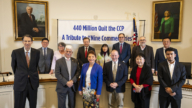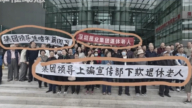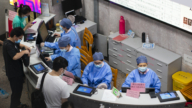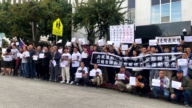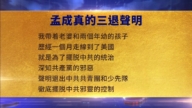【新唐人2011年6月11日讯】中国学者茅于轼发表《把毛泽东还原成人》,批判毛泽东,引发毛泽东的反对者和拥护者们展开了激烈的笔战。拥护者声称毛泽东一身清廉。但却有人指出,毛泽东是中共腐败的源头。那么,毛泽东到底是清官还是贪官呢?
就在挺毛伐毛两种声音此起彼伏之时,网络上又出现了一篇揭发毛泽东的文章。署名“保罗”的作者,在这篇题为《毛泽东乃腐败源头》的文章,开篇就指出:毛泽东的遗产就是政治腐败,并为中共沦为最大经济犯罪集团奠定了制度及思想组织基础。
不过一位陕西吴起的思先生在接受《美国之音》采访时说,毛泽东是为了穷人打江山,没个人利益,很廉洁。
北京历史学者章立凡认为,当时中国人的工资,一个月只有几十块钱,毛的生活大大超过了普通人,说他清廉,有违史实。章立凡认为,怀念毛泽东的人主要是对现实不满。
章立凡:“但是回头也没出路。你真回到毛时代,让你去接受那种低工资,日用品、生活必需品、食品都要配给的生活,我看也没有一个‘毛粉’愿意接受。”
据统计,中国各地为毛泽东建立的行宫就有61处。其中有部分就是在1960年前后,正值中国大饥荒时期,而盖行宫花费的巨资足以充当几千万人的口粮。
1959年毛泽东到韶山故居水库游泳,认为这里是避暑疗养的好处所。第二年这里便耸立起一座仿中南海毛泽东住处的别墅群,集办公室、卧室、卫生间、图书室于一体的“滴水洞”工程,后来还有了防原子弹的地下行宫。造价达1亿元。
另一方面,毛泽东一向被宣传为在1959年到1961年三年饥荒时期,“不吃肉”、与人民“患难与共”。可是,据中共红旗出版社1996年11月版的《毛泽东遗物事典》记载中可以看出,60年代初毛泽东迷上了西式大餐,仅西菜菜谱就包括七大系列,而且他对猪肉情有独钟,光是西菜的猪肉类,毛泽东就吃过至少八种烹饪方式。
在70年代时,为了解决毛泽东的抽烟问题,中共成立了132小组,专门特制四川甚邡雪茄。
章立凡:“他还需要贪污吗?皇上还需要贪污吗?他只需要腐化就行。他这种腐化程度,别的我不敢说,全国各地为他修的别墅,不知道有多少,在当时都是国内最高标准的建筑,有的(他)连住都没住过,有的可能住过几天。”
中共主办的《党史文苑》二○○四年第五期《毛泽东亿万稿酬的争议》中提到,1967年10月毛泽东亲自审核了自己的稿费存单,达五百七十多万,相当于现在的三亿多,是当时的中国首富。1976年毛的存款更高达七千六百多万元。
美国有媒体指出,之所以毛的稿费如此之高,原因是即使1964 年后稿酬制度改革,全国也只有毛泽东一个人独享稿费特权,而且是垄断发行,并且他出的书不断再版。
此外毛泽东的私生活也是最为人津津乐道的话题,在《毛泽东和他的女人们》一书说,记录了毛泽东与一系列女子的非常关系,其中最出名的女人至少有15个。
到底毛泽东是清官还是贪官?人民心中自有一把衡量的尺。
新唐人记者黎安安、王明宇综合报导。
Myth of Mao Zedong’s Incorruption
Chinese scholar Mao Yushi, criticized Mao Zedong
in his book Restoring Deified Mao Zedong to Human.
It has triggered a fierce battle of words
between Mao’s opponents and his advocates.
Some claim that Mao was incorruptible.
Some call him the source of the CCP’s corruption.
Let’s take a look at the report.
Recently, an author with the pen name Paul wrote
An article titled Mao Zedong is Source of Corruption.
It pointed out that Mao’s legacy is political corruption.
Mao also laid the ideological foundation for the CCP
to become the largest economic criminal group.
However, when interviewed by Voice of America,
a Mr. Si from Wuqi in Shanxi Province said,
Mao had no personal interests and was incorruptible.
Beijing-based historian Zhang Lifan thinks that
the wages of ordinary people were meager under Mao.
Mao had a much higher living standard than average.
Saying Mao was incorruptible is contrary to the facts.
Zhang: If people could go back to Mao’s time,
they had to accept low wages and food rationing.
I don’t see any of Mao’s fans willing to do that. (VOA)
At least 61 “palaces” were built for Mao in the past.
Some were built around 1960, during the great famine.
The money spent on the “palace” construction
was enough to feed tens of millions of starving people.
In 1959, Mao swam in his hometown Shaoshan
and found it a perfect place as a summer resort.
Within a year, Dishuidong, a villa group, was built.
It was modeled after Mao’s residence in Zhongnanhai.
An anti-A bomb underground palace was later added,
costing RMB 1 billion to build.
Also, Mao has always been propagandized as
“eating no meat” and “suffering” in the great famine.
However, as per Communist Party’s (CCP)
Red Flag Press Records of Mao Zedong’s Legacy,
Mao was obsessed with Western-style meals in 1960.
His Western menu alone included 7 series of dishes.
He had eaten pork cooked in at least eight methods.
In the 1970’s, to cater to Mao’s smoking needs,
the CCP founded Team132 to produce Shifang cigars.
Zhang: Did Emperor Mao need to embezzle money?
He just needed to live a corrupt life.
I don’t know about other things, but I do know that
there were countless villas built for him across China,
with the highest standards of construction.
He didn’t live in some or lived for just a few days.
In Vol. 5 of CCP-published Dangshi Wenyuan in 2004,
an article Controversies over Mao’s Royalties said,
in Oct 1967, Mao had royalty receipts of RMB 5.7 mil,
which was equivalent to over RMB 0.3 billion today.
This means, Mao was the richest man in China.
In 1976, Mao had bank deposits of RMB 76 million.
As per U.S. media, Mao enjoyed privileged royalties.
Even after the royalty system reform in 1964,
Mao was the only one enjoying such high royalties.
He also had the monopoly of his books’ reprints.
Mao’s private life was the most talked about topic.
The book Mao Zedong and His Women recorded
Mao’s unusual relationship with a series of women,
among whom, there were at least 15 famous ones.
Was Mao Zedong upright or corrupt?
This is judged by the people.
NTD reporters Li Anan and Wang Mingyu


